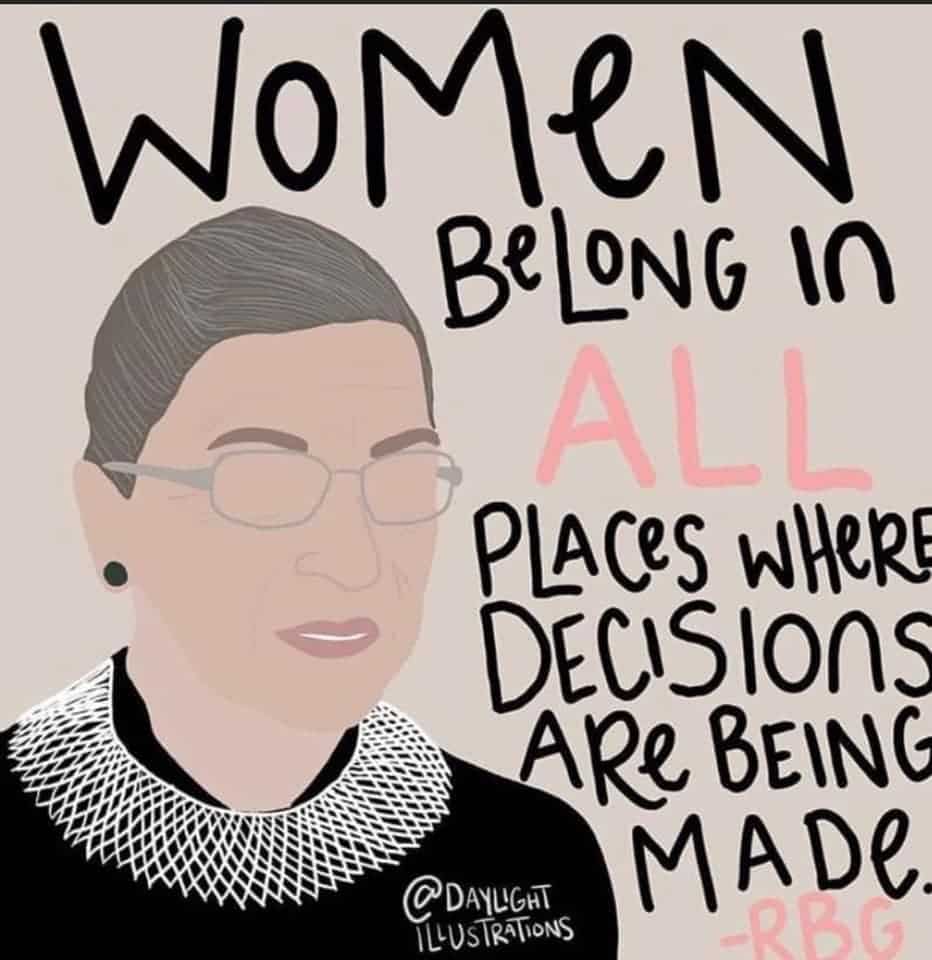Thank Hillary for Getting RBG on USSC

By Dan Murphy
Hundreds of Westchester residents said goodbye to US Supreme Court Judtice Ruth Bader Ginsberg last week by holding rallies and ceremonies across the counties to pay tribute to her 26 years on the highest court in the United States, and for her lifetime of service to our country.
At one event, over one hundred people convened outside Senator Chuck Schumer’s Hudson Valley Office to make clear to Minority Leader Schumer that they expect him to do everything and anything to stop the Republican-controlled Senate from confirming a Supreme Court Justice prior to the inauguration.
Irene Lindberg, a 10 year old from Peekskill and member of the Westchester County Junior Youth Council told the crowd, “If you are a woman and have a credit card in your name and your own credit history, if you have leased an apartment or brought property in your name, if you have consented to your own medical treatment, if you played a sport in school, then you can thank Justice Ruth Bader Ginsburg.”
“Justice Ginsburg fought for women’s rights when no else was. As a single working mother back in the 70s I know what it was like to not have equal pay for equal work, the right to choose, and so miuch more. Those rights are now threatened. We must protect these rights for our daughters and granddaughters. No Supreme Court appointment until after the inauguration,” said Kathie Talbot, Peekskill Common Council Member
“We want Senator Schumer to know we have his back. We have his back, but he must use any, and all, means within the powers and rules of the Senate to prevent the confirmation of any nominee to the Supreme Court,” said Mark A. Lieberman, Indivisible Yorktown.
Another remembrance was held outside the Federal Courthouse in White Plains last weekend.
Many Westchester democrats recalled that it was Hillary Clinton, who played the crucial role of getting Justice Ginsberg nominated by her husband, President Bill Clinton in 1994. “I knew that of all the people who were part of the women’s movement she was one of the key players because of her creative understanding of the law and her sense of commitment,” said Hillary, in 2019 at an event with RBG and Bill Clinton. “I may have expressed an opinion or two about the people he should bring to the top of the list.”
Bill Clinton said of that Sunday meeting that he had known within 10 minutes that he was going to ask Ginsburg to be his nominee for USSC. “I wanted to nominate someone who understood that “we all live under the same set of rules.”
RBG told President Clinton, “if you worried about my age, it was unnecessary.” She was 60 and served for 26 years to age 87 until her passing.
Hillary added that Bill and RBG “hitt it off” at their first interview and meeting at The White House. “They had an extraordinary conversation about the Constitution and the role of the courts. It was a masterclass.
Ruth Bader Ginsburg was someone I had looked up to for a long time—as a young lawyer, and throughout my time practicing and teaching law. She believed that the Constitution had to be interpreted as providing for the equal rights of men and women. She understood there were certain assumptions in the law that favored or disfavored men as well as women, and had the brilliant insight that she could demonstrate that lack of equality by litigating on behalf of men.”
“Her great gift was not only being a brilliant lawyer, litigator, and judge, but also a warm and empathetic human being. She felt the loss of respect and rights that her clients felt. And she felt compelled to try to right those wrongs,”wrote Hillary after RBG’s passing. “This is a devastating personal loss for so many. But more than that, it is a devastating loss for our country. Her memory is already a blessing. May it also be a call to continue her work for justice and equality under the law. A successful life is distinct from a profound and vital one, however.”
Justice Ginsburg was given a little piece of advice on her wedding day by her mother in law many years ago that is still good advice today.
“In every good marriage, it helps sometimes to be a little deaf. I have employed it as well in every workplace, including the Supreme Court. When a thoughtless or unkind word is spoken, best tune out. Reacting in anger or annoyance will not advance one’s ability to persuade.”
Another lesson from RBG’s life, is her friendship with Justice Antonin Scalia. “Despite our strong disagreements on cardinal issues — think, for example, of controls on political campaign spending, affirmative action, access to abortion — we genuinely respect one another, even enjoy one another’s company. Collegiality is crucial to the success of our mission. We could not do the job the Constitution assigns to us if we didn’t — to use one of Justice Antonin Scalia’s favorite expressions — “get over it,” said Ginsberg.
RBG’s lasting legacy will always be her efforts to argue, again and again before she was successful, that the Equal Protection Clause of the Constitution included women. “I was a proponent of the ERA. The women of my generation and my daughter’s generation, they were very active in moving along the social change that would result in equal citizenship stature for men and women…I ask no favor for my sex. All I ask of our brethren is that they take their feet off our necks.”
Her continued service to our country while battling cancer showed how strong she was and, as she told Standford University students years ago the importance of “doing something outside yourself. But if you want to be a true professional, you will do something outside yourself, something to repair tears in your community, something to make life a little better for people less fortunate than you. That’s what I think a meaningful life is. One lives not just for one’s self but for one’s community.”
This reporter’s mother lived during the same time in the 1970’s that RBG was fighting for equal women’s rights. We moved to Yorktown in 1972 and my mother also supported the ERA, and knocked on many a door that was slammed in her face. As a female professional attempting to climb the corporate ladder, my mother met many of the same challenges that RBG met, and had a “food on her neck.” She appreciated RBG’s work, which was successful in changing America.





